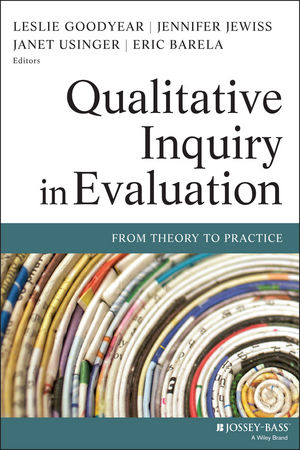Hi, I’m Janet Usinger, another of the co-leaders of the Qualitative Methods TIG, and a co-editor with Leslie Goodyear, Jennifer Jewiss, and Eric Barela of a new book about qualitative evaluation called Qualitative Inquiry in Evaluation: From Theory to Practice (2014, Jossey-Bass).
The process of interviewing participants in an evaluation shares a few characteristics with counseling sessions. Establishing rapport between the interviewer and interviewee is essential to gather meaningful data. Evaluators generally enter the interview session with confidence that a constructive conversation can be launched quickly. There are times, however, when the evaluator finds him or herself at odds with what the interviewer is saying. Sometimes the tension is because there is a philosophical difference of opinion; other times, it is just that the two individuals do not particularly like each other. I have had several experiences interviewing adolescents (and adults) who simply pushed my buttons. Yet removing the individual from the study was inappropriate and counterproductive to the goals of the evaluation.
Hot Tip: Put on your interviewer hat. Your responsibility is to understand the situation from the interviewee’s perspective, not get caught up in your feelings about their statements.
Hot Tip: Be intensely curious about why the person holds the particular view. This can shift the focus in a constructive direction and deepen your understanding of the interviewee’s underlying experiences and perspectives of the issue at hand.
Hot Tip: Leave your ego at the door. Remember, it is their story, not yours.
Lesson Learned: Once I took my feelings out of the equation, interviews with people with whom I do not click have become some of the most meaningful interviews I’ve conducted. This is not necessarily easy, and I generally need to have a little private conversation with myself before the interview. However, once I do, I am able to dig deeper in trying to understand their perspectives, frustrations, and worldviews.
 Rad Resource: More stories about being in the trenches of qualitative inquiry in evaluation can be found in the final chapter of our new book, Qualitative Inquiry in Evaluation: From Theory to Practice (2014, Jossey-Bass).
Rad Resource: More stories about being in the trenches of qualitative inquiry in evaluation can be found in the final chapter of our new book, Qualitative Inquiry in Evaluation: From Theory to Practice (2014, Jossey-Bass).
The American Evaluation Association is celebrating Qualitative Evaluation Week. The contributions all this week to aea365 come from evaluators who do qualitative evaluation. Do you have questions, concerns, kudos, or content to extend this aea365 contribution? Please add them in the comments section for this post on the aea365 webpage so that we may enrich our community of practice. Would you like to submit an aea365 Tip? Please send a note of interest to aea365@eval.org. aea365 is sponsored by the American Evaluation Association and provides a Tip-a-Day by and for evaluators.
